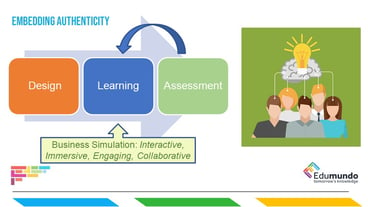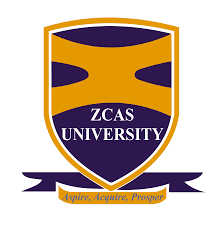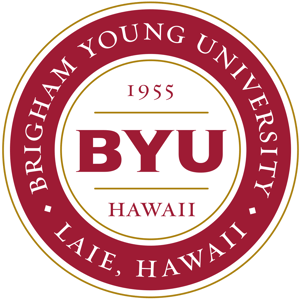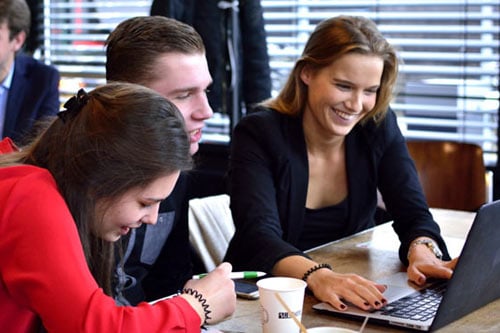"Authenticity, for me, is about how knowledge will be used in a real-life context. We're trying to, in a sense, build in the idea of real-life experience within modules that we teach."
Dr. Vincent Rich, Principal Lecturer, University of Westminster
"Students say they are motivated by solving real-world problems. They often express a preference for doing rather than listening," Marilyn Lombardi explains in her paper: "Authentic Learning for the 21st Century: An Overview".
At Edumundo, we're advocates of 'learning by doing' and in our latest webinar we delved deep into the pedagogical approach of authentic learning, the benefits and challenges around integrating this within teaching and assessment.
We were joined by guest speakers Dr. Vincent Rich, Principal Lecturer, and Dr. Catarina Cardoso, Senior Lecturer, from the University of Westminster for their insights and experience on the topic and how they've used business simulations to bring authentic learning to life.
We were also joined by 50 participants on the day, ranging from locations such as Halifax, Canada, to Amman, Jordan.
Integrative Module - Mixing Inter-disciplinary students
Both Vincent and Catarina's approach to authentic learning is exemplified in their second year 'Management Decision Making' module. In the most recent intake, this module had around 700 students from across eight specialist pathways across the business management programme. Vincent explained the challenges behind this:
"This variety adds a level of complexity as we have students who may be more technical and numerical like students studying on the Finance or Economics pathways and on the other extreme they may be on pathways like HRM that require more soft skills.
What we try to do in the module is to pull together all the learning from their first year and previous modules from across this inter-disciplinary mix of students. This has proved to be quite difficult at times. However, the simulation has proved incredibly valuable in bringing to life the concepts and techniques, moving into operational decision-making instead of focussing solely on theory."
"Interactive, Immersive, Engaging, Collaborative"
Vincent then explained the rationale to use business simulations in their teaching:
%20v1.gif?width=382&name=Authentic%20Learning%20-%20Gif%20(higher%20quality%20for%20SIB)%20v1.gif)
If you read the literature about simulations. They all refer to them as being: 'interactive, immersive, engaging, and collaborative' in how students interact with them.
They [business simulations] all bring traits of authentic learning. The simulation is dynamic and driven by the interactions from the students. When they play them in teams the problems they face could not be solved independently they have to be solved in groups which mirrors group tasks in the workplace.
There is a built-in element of reflection, perhaps social-reflection, within teams where they discuss, question outcomes, and interrogate data in a cooperative way. It's an authentic way students can learn and the simulation is an effective vehicle to get them to do that."
Their authentic learning approach is not solely designed for the simulation exercise; it also covers students' assessment on the module.
Authentic Assessment
"Assessment is the key to this [authentic learning]. You would really have to begin here and decide what we want students to achieve by studying on the module." Dr. Vincent Rich
The discussion moved on to authentic assessment where Catarina provided an overview of the two assignments on the module:
"We changed from an exam-based assessment to a presentation as
signment. Now, they're tasked with providing a rationale behind the decisions they made [in the simulation]. They previously did a group presentation but we reverted to individual ones. The second assessment is based on a case study report. Here, the simulation helps students to learn from their experience and reflect on that in the presentation and then use that acquired knowledge to inform their responses in the case study report."
One aspect they debated when deciding the module assessment was whether to weigh assessment on the simulation performance or not. Vincent explained why, in the end, they decided to award marks based on their company's performance.
"We don't heavily weight the simulation performance in assessment. This can be a dangerous route to follow given some of the decisions are open to chance. However, we do provide marks for performance to mirror incentives such as bonuses in the real-world and it also incentivises students to take the exercise seriously as it does count."
During the later Q&A session, one participant asked:
"How did you move away from group assessment? If there is no group assessment what makes the students be team players/play ball?"
Here was Catarina's response: "We found in the group assessment some students would take more of a lead and do more of the work, so individual assessment diminished this. They were also able to fully express their own opinions and evaluation on their team's performance so they had more of a voice through the individual assessment."
Vincent also added: "They also often work well as a group because they're incentivised by the fact we weighted some of their overall mark, albeit a small amount, on the ranking of their company in the simulation."
Skills Development and Self-Guided Learning
"They practise decision-making without knowing the answer from research, you won't find the answer in a book, nor from a Lecturer." Dr. Catarina Cardoso
Catarina also outlined how they develop soft-skills in terms of networking and team-working i.e. meeting new students they may not have met otherwise and learning to work with them in a team-based, competitive setting.
"They learn a number of skills. In terms of 'soft skills', initially it's team-working, some find it easy; some find it hard. There's also an element of learning reflective skills. They learn to evaluate, rationalise, and deliver presentations, particularly for the individual presentation assessment. They also employ some of the hard skills, recalling the knowledge they've obtained in this module and previous ones and applying it to a realistic assignment."

Our host, Leon Lloyd also expanded on this element of self-guided learning:
"Perhaps when students come to university they see outcomes as right and wrong answers but as they progress those 'right' and 'wrong' answers are open to interpretation. This simulation exercise helps students develop these critical analysis skills and question outcomes or decisions."
Leon also referred to Lombardi's '10 point checklist' for authentic learning (2007, Lombardi, M.), citing one of the ten:
"Lombardi's point about 'sustained investigation' is relevant here, where problems cannot be solved in a matter of minutes or even hours. This rings true in the simulation exercise as often overall outcomes and reasons behind performance are not as black and white, right and wrong."
From Catarina's experience, students have to look for answers from their own experience and not from more traditional methods:
"They practise decision-making without knowing the answer from research, you won't find the answer in a book, nor from a Lecturer."
Learning from failure
Whilst the competitive element can reap many rewards in terms of student engagement and motivation, there's also an added learning opportunity for students to harness. As Leon pointed out:
"We learn a lot from failure. Finishing last does not mean they haven't learned or are continuing to learn from that experience. It's also common to see students perform very well in their assignments despite their company not performing well in the simulation."
Catarina expanded on this point referring to her experience with students who were keen to know how and why they performed as they did.
"When students' companies don't perform as they'd like in the simulation, we go through the material we covered in the lectures and workshops and they begin to realise the parallels in the game and material and why their company performed as it did."
Blended Learning - Opportunities and Challenges
"In-person students are more active, more likely to interact with others than in online settings. However, they're able to benefit from using the technology within the simulation, as well as manage their own inputs, using shared spreadsheets as well as other online tools to project manage the simulation experience." Dr. Vincent Rich
Buisness Simulation Demo and Q&A Session
.gif?width=354&name=Trainers_Start-up_AdobeCreativeCloudExpress%20(1).gif)
Thank you to all our guest speakers and participants for attending. Our aim is to create an interactive experience for all attendees so it was great to see participants asking questions in the chat box throughout and in the Q&A session.




.png?length=300&name=unnamed%20(11).png)
.png?length=300&name=unnamed%20(7).png)
.png?length=300&name=unnamed%20(8).png)
.png?length=300&name=unnamed%20(6).png)

.png?length=300&name=unnamed%20(10).png)
.png?length=300&name=unnamed%20(5).png)
.png?length=300&name=unnamed%20(9).png)
.png?length=300&name=unnamed%20(4).png)
.png?length=300&name=unnamed%20(2).png)
.png?length=300&name=unnamed%20(1).png)
.png?length=300&name=unnamed%20(3).png)
.jpg?length=300&name=unnamed%20(2).jpg)





.png?length=300&name=loughborough-university-logo%20(small).png)





